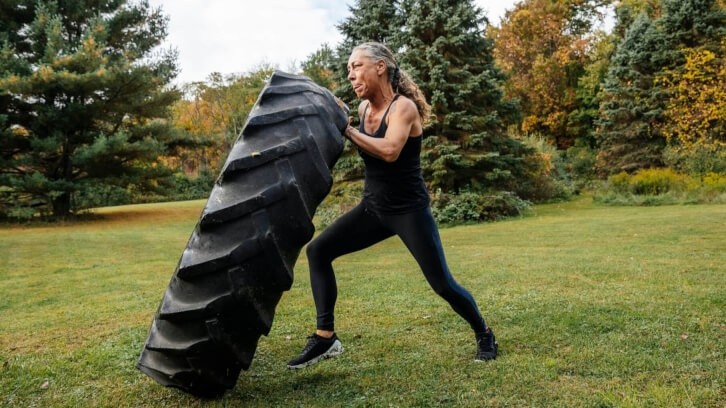More stimuli needed to build muscle in postmenopausal women: Study

Published in the Journal of Applied Physiology and funded by global independent consulting firm Increnovo, the randomized controlled, parallel-group trial examined the temporal responses of myofibrillar protein synthesis rates and anabolic signaling to resistance exercise alone or in combination with protein supplementation in postmenopausal women as compared to postabsorptive rates in younger women.
“Our study showed that the muscle building effects of exercise and nutrition are impaired in menopausal women compared to young women,” said Dr. Ralf Jaeger, managing member at Increnovo. “As a consequence, postmenopausal women need a greater stimulus to build muscle, either by working out harder or consuming greater amounts of protein.”
The nutritional supplement used in the study was provided in powdered form by Curves Japan Co. and contained whey protein isolate fortified with vitamins C, B1, B2, B3, B5, B6 and B12 and minerals calcium, magnesium, iron, zinc and potassium.
Tackling postmenopausal muscle
Age-related muscle mass loss, known as sarcopenia, is one of the more significant threats to the ability to remain healthy and function independently as people age. Decreased physical activity leads to muscle atrophy, loss of appetite resulting in nutrient deficiencies, and ultimately reduced quality of life and death, Dr. Jaeger noted.
In women, the hormonal changes in menopause have been associated with an acceleration of muscle mass loss, as well as increased visceral fat and decreased bone density. Compared to aging males, postmenopausal females suffer from sarcopenia and musculoskeletal injuries at a greater rate.
While feeding and resistance exercise are presented as lifestyle strategies that support healthy muscles by stimulating myofibrillar protein synthesis in healthy adults, the study authors noted that this anabolic characterization of ‘healthy adults’ has been principally focused on male populations.
“Resistance exercise and protein ingestion have been shown to act separately and together to increase muscle protein synthesis rates in healthy young males, young females and older men; far less information exists in post-menopause,” they wrote. “In fact, the post-exercise regulation of myofibrillar protein synthesis rates in response to resistance exercise alone (in absence of nutritional intake) has not been studied in post menopause.”
Study details
For this female-specific study, the researchers recruited 16 healthy postmenopausal women between the ages of 50 and 79 years, who are part of a larger investigation defining exercise and nutritional strategies to augment the regulation of muscle mass in females.
Participants completed an acute bout of unilateral resistance exercise before consuming either a fortified whey protein supplement or water. They then received primed continuous infusions of a L-[ring-13C6] phenylalanine tracer accompanied by bilateral muscle biopsies before and after treatment ingestion at 2 hours and 4 hours in non-exercised and exercised legs to determine effects on myofibrillar protein synthesis (primarily responsible for changes in skeletal muscle mass following resistance training).
Results were compared to a pre-menopausal cohort of women between the ages of 20 and 45 years who performed the trials during the follicular phase of their menstrual cycles as part of previous studies within the laboratory.
“Ingestion of 15 g whey protein failed to stimulate myofibrillar protein synthesis in postmenopausal women,” the researchers concluded. “While resistance exercise with and without feeding stimulated late (2-4 h) and early (0-2 h) increases in myofibrillar protein synthesis, further exercise and nutritional manipulations may be necessary to robustly stimulate the skeletal muscle adaptive response.”
As noteworthy finding, the study highlighted that post-menopause modulates baseline MPS that may be contributing to a diminished MPS response to the fundamental anabolic stimuli of protein ingestion and resistance exercise in females.
“[O]ther works have demonstrated an elevated basal mixed muscle protein synthetic response in older females compared to older males,” the researchers wrote. “This sex-based difference in basal muscle protein synthesis rates is not present when comparing younger males and females.”
Dr. Jaeger noted that more research is needed to explore this outcome, as well as nutritional strategies that could potentially increase muscle health in menopausal women and increase the efficacy of protein supplementation in older adults.
“We speculated that blood flow plays a crucial role and will publish a paper on the effects of adding nutritional blood flow ingredients to protein in postmenopausal women later this year,” he added.
Source: Journal of Applied Physiology
doi: 10.1152/japplphysiol.00886.2023
“Postabsorptive and postprandial myofibrillar protein synthesis rates at rest and after resistance exercise in women with post-menopause”
Authors: Colleen F. McKenna et al.















